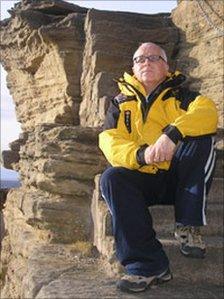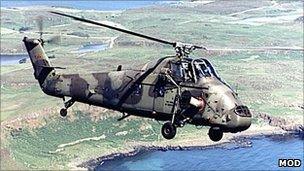RAF mountain veteran on search and rescue's future
- Published

David "Heavy" Whalley was a search team leader at the Lockerbie disaster
A UK government announcement on a plan to privatise RAF and Royal Navy search and rescue (SAR) operations - which had been expected on Tuesday - is understood to have been delayed.
The move would have seen Sea King helicopters replaced by the S-92, a helicopter already in service with the Maritime and Coastguard Agency (MCA).
RAF veteran David "Heavy" Whalley said any switch to the newer helicopter - and in his opinion better aircraft - in the future must come with a package of training for mountain rescue teams.
David has almost 40 years experience in mountain rescue in Scotland.
He served as team leader of RAF Leuchars and Kinloss mountain rescue teams (MRTs) and worked for four years in the Kinloss air rescue co-ordination centre.
He was also a senior team leader at Lockerbie when a Pan Am jumbo jet, carrying 258 passengers, crashed on the Scottish Borders town in 1988.
A former chairman of the Mountain Rescue Committee of Scotland, David joined Torridon MRT after retiring from the air force.
Drawing on that background, he sees good and bad in what was proposed for the future of search and rescue.
He said: "There have been big changes afoot for a long time and the financial climate is certainly not helping the situation.
"But though I have a military background I have no fears about the use of civilian operators having worked with them for a long time.

Heavy worked with Wessex helicopters before they were replaced by Sea Kings
"The problem I do have is that if this new helicopter - which is a wonderful aircraft - comes into being, then a package of training on working with it must be given to mountain rescue teams."
During his military service Heavy was involved in the move from Wessex helicopters to the Sea King.
With Torridon MRT he has taken part in rescues where casualties have been airlifted by an S-92.
The S-92 is larger and has a more powerful down draft than the Sea King.
"When the Wessex changed to the Sea King we did a lot of training, much of it at night with night vision goggles," David said.
"And you don't just have to train in summer - winter operations are completely different."
He said replacing the Sea King would come eventually and have to be accepted, adding: "Every member of a mountain rescue team would have to be trained in working with the new aircraft.
"To train teams of 30 to 40 people takes a lot of time and a lot of money. I would plead with the government to get that training package right."
- Published14 December 2010